Inflammatory Bowel Disease in Cats
Inflammatory Bowel Disease in Cats (IBD in cats) is a syndrome caused by chronic irritation within a feline’s intestines or stomach. The inflammation of the cat’s gastrointestinal tract is often the result of an injury or the presence of a foreign substance.
When a cat has IBD, inflammatory cells will invade the stomach or intestinal walls. This makes the walls to thicken and prohibits proper digestion and absorption of food. Inflammatory bowel disease in cats can occur at any age. However, the syndrome most commonly affects older felines.
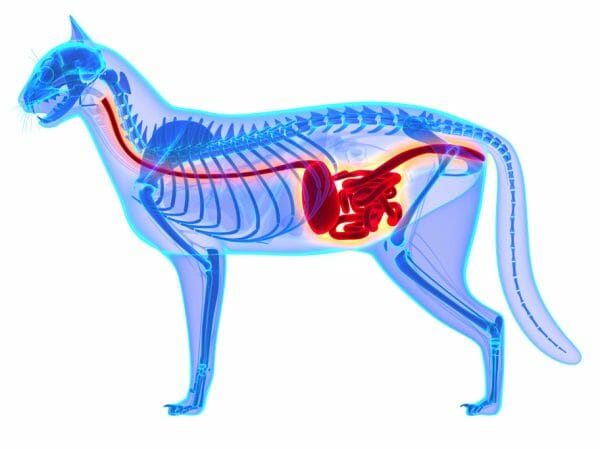
What Are the Symptoms of Inflammatory Bowel Disease in Cats?
Inflammatory bowel disease cat symptoms include:
- Diarrhea
- Vomiting
- Bloody stools
- Loss of appetite
- Lethargy
- Weight loss
- Flatulence
- Abdominal pain
The severity of these symptoms may vary drastically depending on which part of the gastrointestinal tract is affected. If the higher areas of the cat’s small intestine or stomach are affected, chronic vomiting may be the leading symptom. When the colon becomes inflamed, this may lead to diarrhea or bloody stools. Unlike conditions such as constipation or megacolon in cats, there is no difficulty in defecating.
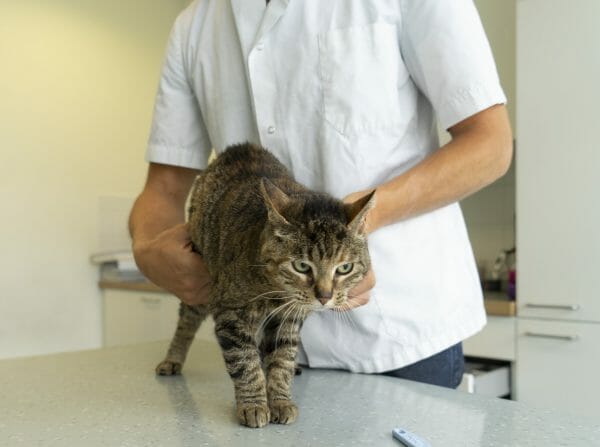
What Are the Different Types of IBD in Cats?
There are several forms of feline IBD, the type that a cat has depends on the area of the gastrointestinal tract affected and the specific inflammatory cells that are involved. In certain cases, inflammatory bowel disease may affect other organs such as the pancreas and the liver.
- Gastritis occurs when the stomach becomes inflamed
- Enteritis affects the small intestine
- Colitis affects the colon (large intestine)
The most common type of IBD is Lymphocytic Plasmacytic Enteritis. This occurs when plasma cells and inflammatory lymphocytes infiltrate the small intestine. Another kind of inflammatory white blood cell involved in IBD is eosinophils. This is often the predominant cell. However, these may also form part of a mixed population of cells.
Two of the least common types of IBD are:
- Neutrophilic IBD involving neutrophils
- Granulomatous IBD involving macrophages
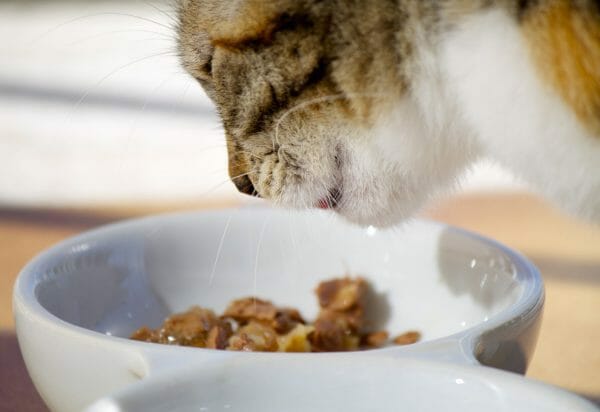
What Causes IBD in Cats?
The precise cause of feline IBD remains unknown. However, it is thought that the condition is the result of complex interactions between intestinal bacteria, the cat’s immune system, the presence of parasites, diet, and other factors (such as the surrounding environment).
Spiral-shaped bacteria such as helicobacter pylori can result in chronic vomiting. These bacteria are known to lead to diseases and stomach ulcers. However, they are often present in cats that have none of these symptoms. This means that identifying their presence on a biopsy is not indicative of feline IBD and is only regarded as a pathogen when the stomach mucosa is inflamed.
In certain cases, allergies to food may be a major contributing factor. This may include additives, preservatives, gluten, milk proteins, and meat proteins. Genetic factors may also play a role in causing feline IBD.
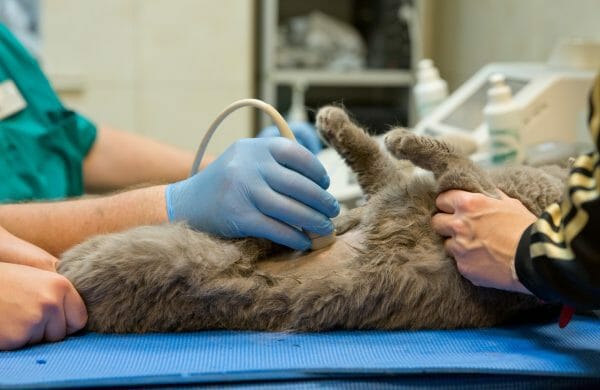
Diagnosing IBD in Cats
In order to diagnose IBD, a veterinarian will need to carry out extensive tests such as:
- Blood tests
- X-rays
- Fecal examinations
- Urinalysis
- Abdominal ultrasounds
These diagnostic tests will identify feline leukemia, hyperthyroidism, cancer, metabolic disease, bacterial infections, and parasites. The veterinarian will also look at the levels of folate and vitamin B12 within the bloodstream as IBD may prevent their absorption from the gastrointestinal tract. To rule out food allergies, the veterinarian may also recommend a hypoallergenic food trial.
To provide a definitive diagnosis, the cat’s intestine will be biopsied. Cats that have IBD have more inflammatory cells within the wall of the intestinal tract. Identification of these cells will determine which course of treatment will be required. The biopsy will be performed using an endoscope. This is a flexible camera that is either passed through the rectum or is inserted via surgery.
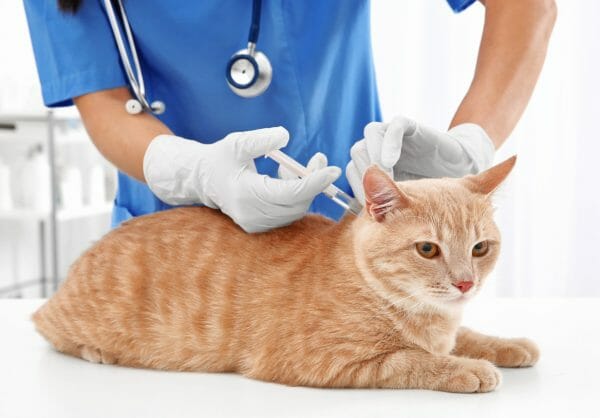
How to Treat Inflammatory Bowel Disease in Cats
The primary goals of treatment for inflammatory bowel disease are to:
- Relieve gastrointestinal symptoms
- Reduce the response from the cat’s immune system
- Stabilize the weight of the cat
To determine the right course of cat IBD treatment, the veterinarian will first need to identify the underlying causes. The chosen course of action may include a combination of medication, dietary modifications, supplements, and deworming treatment.
Where the underlying cause is an allergy, switching the cat to a hypoallergenic diet may ease symptoms. The recommended diet may be made up of novel proteins and carbohydrates that the cat will not have been previously exposed to (such as rabbit, venison, or duck). Food trials may require testing several diets, and it can take several attempts to find the right option. In many cases, a diet that is rich in fiber and low in fat will also be helpful.
In addition to changes to diet, medications such as metronidazole, corticosteroids, immunosuppressive agents, and anti-inflammatory drugs may also be prescribed.
Using prebiotics and probiotics will assist in balancing the presence of good bacteria in the gastrointestinal tract. In addition, using psyllium in food will help ease inflationary colitis. To ensure the cat is not deficient in vitamin B12 or folate, an injection can be administered.
Finally, the veterinarian may suggest a fecal microbiota transplant (FMT). This surgical procedure provides a cat with a supply of healthy bacteria from a donor.
Inflammatory Bowel Disease Cats Life Expectancy
Although there is no cure for inflammatory bowel disease in cats, the prognosis is typically good for most felines that suffer from the condition as the symptoms can be managed with the right treatment. This allows the cat to live a comfortable life for many years. If the cat is diagnosed early and treatment is provided immediately, the better the chances of recovery will be.
However, in some cases, a feline may not respond to the treatment put forward by the veterinarian. When this is the case, further diagnostic examinations may be required to identify any underlying disease. In such circumstances, the prognosis for these cats will be poor.
Occasionally, inflammatory bowel disease will lead to the cat developing intestinal lymphoma, a type of cancer that affects the intestine.



